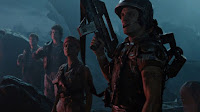On the very, very off chance you didn’t know, George Lucas was the writer/ director/ creator of a little seres of movies that went under the header of Star Wars. They sold a ticket or three at the box office. I heard there were even one or two spin-off toys.
Okay, I used to own a bunch of the spin off toys. Almost all of them. Except for the blue Snaggletooth. And the Bespin Leia, who had a weird-looking tiny head.
Anyway…
The first trilogy did very well, as I mentioned. It made tons of money and inspired a whole generation of storytellers to pick up pen, pencil, or home video camera. There was a great piece I read years back about when John Williams created the new Star Wars orchestra for the prequel movies. There were half a dozen musicians in it who had been part of his original orchestra twenty years earlier. It also had about a dozen younger musicians, all of whom had gotten into classical music because they were inspired by Williams’s score from the original trilogy. And now they were all working on the prequels.
Ahhhh, the prequels.
The prequels were not quite as well-received. Oh, fans were in a frenzy at first. I know. I was there in the line at Toys R Us for the special midnight releases. After the first movie, though, that energy ebbed a bit. After the second movie it was leaking away. By the final film, the fan base was bleeding out, to turn a phrase. There were still some die-hards, but there were far more shrieking about how Lucas had “raped their childhood.”
So, what went wrong?
Well, you could point at a lot of things. Wooden dialogue. Bad direction. A gluttonous use of decent-but-not-great CGI. Any one of these can hurt a film, but I don’t think they’re killers on their own. I think the biggest mistake Lucas made with his prequel was the unavoidable one.
He told a story we already knew.
Let me pause at this point for a funny story…
Many years back I went home to New England to see my family. My mom and I decided to go take in a movie, and the big one at the time (no pun intended) was James Cameron’s Titanic. I hadn’t seen it, she hadn’t seen it, what the heck.
 Well, we all know the story. Big ship. Bigger iceberg. We were maybe two-thirds through the film and there’s that awful bit when Leonardo’s working-class buddy grabs a life preserver and hurls himself out into the icy water. He’s paddling away from the cries and howls and there’s this ear-splitting crack. The cables are snapping on the smokestacks. One of the huge towers creaks, tilts, and swings down over the water. Nameless friend of Leo (oh, come on–none of you remember his name, either) looks up as the smokestack blots out the sky and comes crashing down on top of him.
Well, we all know the story. Big ship. Bigger iceberg. We were maybe two-thirds through the film and there’s that awful bit when Leonardo’s working-class buddy grabs a life preserver and hurls himself out into the icy water. He’s paddling away from the cries and howls and there’s this ear-splitting crack. The cables are snapping on the smokestacks. One of the huge towers creaks, tilts, and swings down over the water. Nameless friend of Leo (oh, come on–none of you remember his name, either) looks up as the smokestack blots out the sky and comes crashing down on top of him.
The audience wailed. People were already blubbering and misty eyed, but when Leo’s buddy was killed, well, that was the breaking point. Audience members were sobbing and crying out to the screen.
In the midst of all this, my mom turns to me and says, in a very loud, clear voice…
“What did they think was going to happen? It’s the Titanic, for Christ’s sake!”
So here’s problem one. As I’ve mentioned before, you can’t have drama or conflict in a story if the outcome is never in doubt. When we know what’s going to happen, it’s very, very easy for a story to veer off into boredom, melodrama, or both.
Not only that, but when we’ve already seen chapters thirty through fifty, we don’t want to go back to chapters one through ten. That’s moving backwards. We want to be going forward. You may notice that with much of the recent coverage of the crises in Japan, no one’s going back to do a retrospective on the Tokugawa shogunate of the 17th century. It’s an important part of Japanese history. It has a fair degree to do with why thing are the way they are in Japan today. But we really don’t need to know it to understand why a trio of nuclear reactors are being stabilized with hoses and buckets.
Now, in all fairness, and with all deference to my mother, Cameron’s Titanic is not about the ship. It’s a story of, if you’ll pardon the phrase, two star-crossed lovers which uses the disaster as a backdrop. The Titanic is no different than the feud between the Capulets and the Montagues or the impending gang war between the Sharks and the Jets. Can we even call that a war? The impending dance-off between the Sharks and the Jets. These are the plot elements that let the reader know from the start just how doomed this relationship probably is.
See, that’s the catch. We all know what happens to the Titanic. It’s a historic fact. We don’t know what happens to Leo and Kate, though. Will they survive? Will they die together? Apart? Will she live to be a middle-class ninety-year-old and toss a diamond worth a billion dollars into the depths of the Arctic Ocean as a meaningless gesture to her spring break fling who died three-quarters of a century ago?
Probably not that last one, because that would just be silly.
It’s the rest of those questions that make the story worth telling. I’ve talked about the problem with god-like forces in a story, and history is one of the most powerful ones out there (unless you happen to be a Time Lord…). If I know for a fact that character A survives until chapter thirty, it’s very difficult to get worried when she’s threatened in chapter three.
Obi-Wan Kenobi. Anakin Skywalker. Padme. R2-D2 and C-3P0. Yoda. Palpantine. Chewbacca. Bail Organa. The fate of every one of these characters was well-established twenty years ago in the original trilogy. Lucas asked us to make an emotional investment in characters we were already emotionally invested in. He asked us to worry about the future of characters whose future we already knew.
To be honest… that’s just plain boring.
This is the big challenge with any sort of “prequel” writing and it’s why a lot of these works tend to ring a bit hollow when all is said and done. To be honest, it’s one of the reasons I haven’t been all that interested in writing prequel stories for any of the characters in the Ex-Heroes universe. It’s also why The Nativity Story didn’t really work as a two hour feature film. We know what happens to these characters, so anything that happens in the story is automatically going to get robbed of some or all of its dramatic weight.
So, the burning question is… how do you make a prequel story work?
It’s not that hard, if you think about it. Don’t focus on events. We know the events. We know what’s going to happen. So that’s a dead end right there.
No, the secret to a good prequel is the characters. Don’t tell me about the guy I already know. Tell me about the other guy who was there. For example, we all know what happened to Abraham Lincoln that fateful night at Ford’s Theater. But what about the people sitting behind him? What about the security men on duty? Were they injured? Wracked with guilt afterwards? Secretly pleased? We don’t know the answers, so those are interesting questions.
You may have seen either the original version of The Clone Wars cartoon or the newer one that’s run for a couple seasons now. It’s very popular. It also focuses more on characters like Mace Windu, Cad Bane, and Kit Fisto–characters we don’t know that much about.
If only all the prequels had done the same.
Next time… well, I think we’ve finally come to the end.
Until then, go write.
 Maybe twenty minutes in, one of the civilians asked a grunt why they were all so dedicated to the sergeant. And said grunt told him this two or three minute story about how, five years ago, they’d been stationed on Theta Sigma, things went belly-up one night on patrol, and Sarge was the only one who kept it together. He got them out of that hell-zone on the death planet, and he even carried Bronsky for the last three miles.
Maybe twenty minutes in, one of the civilians asked a grunt why they were all so dedicated to the sergeant. And said grunt told him this two or three minute story about how, five years ago, they’d been stationed on Theta Sigma, things went belly-up one night on patrol, and Sarge was the only one who kept it together. He got them out of that hell-zone on the death planet, and he even carried Bronsky for the last three miles.


